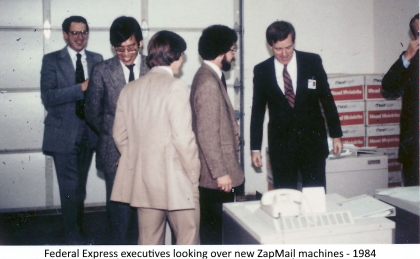
The "salmon-swimming-upstream" experience of trying to create a new venture amidst the din of competing, chattering [online] voices reminds me of my experience in the early days of Federal Express. Recently, I noticed a feature on LinkedIn, link provided below, about the VERY early days when the tiny upstart flew hollowed-out French corporate jets called Dassault Falcons.
I jumpseated on a Falcon in its final days of service, right before they all began to leave the fleet. You sat on a pull-down jumpseat attached to the flight cabin door, perched almost between the two pilots, and your knees literally stuck right in the way of their reach at some of the controls.
FedEx began in 1973 with a package-sorting "hub" in Memphis, TN that consisted of what amounted to a card table with a handful of envelopes and small parcels shuffled around like rejects at the close of an estate sale. On that first night, they must have felt like Forrest Gump dumping out that first net full of trash on the deck of the "Jenny." The story that used to be repeated was, "Seven planes flew in; five packages were unloaded."
Obviously, the volume of shipments began to grow, slowly at first—and then very fast. The rest is history.
I was hired in Fall 1982 as a part-time courier in downtown New Orleans, as part of a staffing-up in anticipation of business growth when Priority Overnight delivery was upgraded from 12:00 noon to 10:30 a.m. Yes, the business literally EXPLODED! Just out of a job as a local TV news reporter, I was hoping to move into a sales, marketing, or even a PR role with the rapidly growing company.
Fast-forward just about a year, to Spring 1984, and I was on my way to Denver, with a marketing territory stretching West and North: the entire states of CO, UT, WY, MT, ID, WA, OR as well as all of Alaska and Hawaii. My job: convince office building managers to allow Federal Express Drop Boxes to be installed on their premises for use by our customers—their tenants!
However, not so fast: our nationwide marketing team of 16 people were "on loan" to a development group planning for a brand new company offering. We called it by its pre-launch name, "Gemini." It was a massive $1 Billion, bet-the-company attempt to blanket the nation with a rapid-transmission fax network so business people could send documents anywhere in TWO HOURS.
Our team's responsibility in the development phase was to secure locations, called "closet sites" where transmission machines—scanners and "twin" (hence, the developmental name "Gemini") printer units about the size of a home washer and dryer would be located to be closer to customers than the network of available physical Federal Express offices. These closet sites shortened the couriers' travel times to transmission (or printout) sites, and thereby allowed the 2 hour pickup-transmission-delivery commitment to reach the desired 80-85% of the nationwide business community.
So over my first few weeks in Denver, I flew to Salt Lake City, Albuquerque and Santa Fe, Great Falls, Boise and other picturesque spots around the west. A scant three weeks before the nationwide launch, my task was to look over these secured closet locations to ensure a site readiness checklist was met for each. Think small broom-closet-like cubicles in office complexes, and in some remote locations, even hotel rooms secured on a yearly basis.
Let's jump forward again—this time to the Summer of 1986. After only two years, the ZapMail experiment was shut down. We were victimized by the Challenger Space Shuttle tragedy, which indefinitely postponed Federal Express' plans to launch our "FedStar" satellite to enable faster ZapMail transmissions. Also, our company's own missteps in the overall concept and deployment of the service.
That summer, at a national sales meeting, our founder and CEO Frederick W. Smith told us all something profound and heart-warming: "The only thing worse than this outcome would be to work at a company that didn't have the courage to try it."
I had some personally memorable and amazing experiences in my time at FedEx. Now, here I am, again trying something new. In the same near total obscurity they must have felt around that card table on the first night in Memphis in 1973.
DOC$ is starting with a pittance in terms of user experience—just a few "test" records of consumer healthcare purchases. But dreaming of a day when we will have a robust, searchable collection of listings for every major metropolitan area, submitted by our users—to compare prices for procedures like MRIs, CT-Scans, Physical Therapy, and other expenses we'll all have to pay for when the bill arrives. A database of millions and millions of valuable reports of people telling each other about Healthcare purchases, bringing price transparency, competition, and value to this giant marketplace that comprises 1/6 of the entire US economy.
And again, "Ground Zero" is right in the distribution heart of America: Memphis, TN.
Know The Cost of Healthcare BEFORE You Go In!
Here's the link to the FedEx/Dassault Falcon feature: https://rb.gy/yldrfj